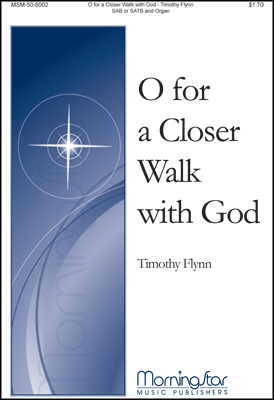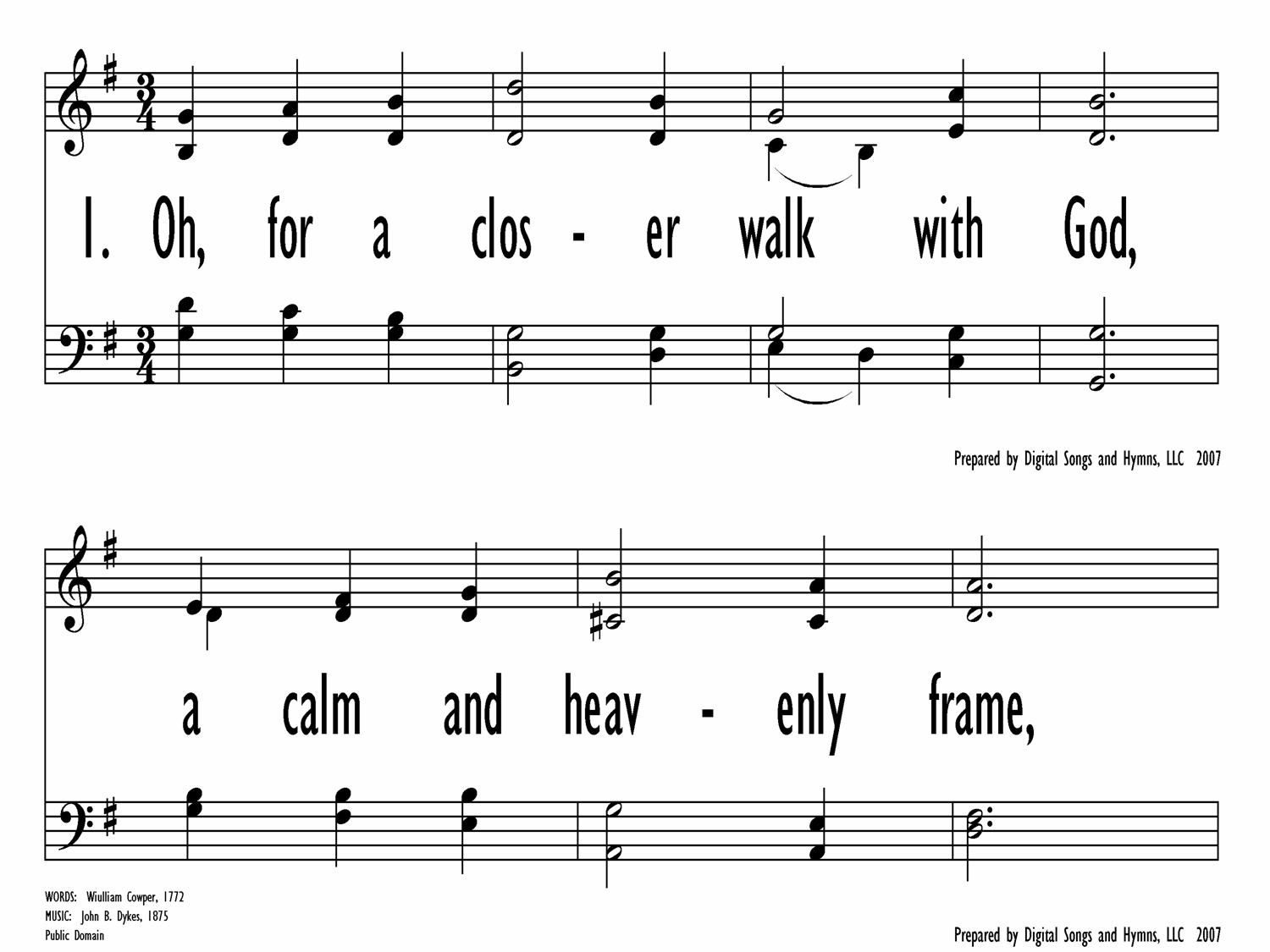Scripture References:
st. 3-4 = Ps. 51:12, Job 29:2-3
st. 5 = Heb. 12:14
William Cowper (PHH 434) wrote this text on December 9, 1769, during the illness of his long-time friend and housekeeper, Mrs. Unwin. In a letter written the next day Cowper voiced his anxieties about her condition and about what might happen to him if she died. Saying that he composed the text "to surrender up to the Lord" all his "dearest comforts," Cowper added,
Her illness has been a sharp trial to me. Oh, that it may have a sanctifying effect!. . . I began to compose the verses yesterday morning before daybreak, but fell asleep at the end of the first two lines; when I awoke again, the third and fourth were whispered to my heart in a way which I have often experienced.
The text was published in Richard Conyers's Collection of Psalms and Hymns (1772) and, with some revision, in the Olney Hymns (1779). There it had the heading "Walk with God" and included a reference to Enoch in Genesis 5:24. The original fourth stanza is omitted.
Although Cowper frequently battled depression, doubt, and melancholy, this text speaks of a very intimate walk with the Lord. That walk is rooted in Scripture (st. 1), rejoices in conversion (st. 2-3), and denounces all idols that would usurp God's sovereignty (st. 4). The text concludes with a return to the prayer of the first stanza, but now that prayer is sung with increased confidence and serenity.
Liturgical Use:
For occasions of aspiration, hope, and encouragement for a more intimate walk with God; a fine testimonial hymn.
--Psalter Hymnal Handbook
===========================
O for a closer walk with God. W. Cowper. [Walking with God.] This is one of the most beautiful, tender, and popular of Cowper's hymns. It appeared in the 2nd edition of R. Conyers's Collection of Psalms & Hymns, 1772, in 6 stanzas of 4 lines, and again in A. M. Toplady's Psalms & Hymns, 1776, and in the Olney Hymns, 1779, Book i., No. 3, and headed, "Walking with God." It is based on Gen. v. 24, "And Enoch walked with God." It is in extensive use in all English-speaking countries, and usually in its original form.
--John Julian, Dictionary of Hymnology (1907)
====================
O for a closer walk with God , p. 829, ii. In Notes and Queries , July 30, 1904, in one of a series of the poet Cowper's hitherto un¬published letters, under date of Olney, Dec. 10, 1769, after referring to the serious illness of his friend and companion, Mrs. Unwin, in words of great beauty and tenderness, he adds:—
“When I consider the great meetness to which the Lord has wrought her for the inheritance in light; her most exemplary patience under the sharpest sufferings; her truly Christian humility and resignation; I am more than ever inclined to believe that her hour has come. Let me engage your prayers for her and for me. You know what I have most need of upon an occasion like this. Pray that I may receive it at His hands, from whom every good and perfect gift cometh. She is the chief of blessings I have met with in my journey, since the Lord was pleased to call me, and 1 hope the influence of her edifying and excellent example will never leave me. Her illness has been a sharp trial to me. Oh! that it may have a sanctified effect, that I may rejoice to surrender up to the Lord my dearest comforts, the moment He shall require them. Oh! for no will but the will of my Heavenly Father!
"I return you thanks for the verses you sent me, which speak sweetly the language of a Christian soul. I wish I could pay you in kind ; but must be contented to pay you in the best kind I can. I began to compose them yesterday morning [Dec. 9, 1769], before daybreak, but fell asleep at the end of the first two lines: when I awaked again, the third and fourth were whispered to my heart in a way which I have often experienced:—
"Oh for a closer walk with God
A calm and Heavenly frame,
A light to shine upon the road.
That leads me to the Lamb."
[Here follow the remaining five stanzas of the hymn, and the letter concludes:] "l am yours, my dear Aunt, in the bands of that Love which cannot be quenched, &c.
“W. C."
The light which this letter throws upon the hymn is intense and searching. We read a new and pathetically personal history and meaning in the earnest and throbbing lines, and are brought face to face with an agony which would have been voiceless but for the mercy and goodness of God.
--John Julian, Dictionary of Hymnology, New Supplement (1907)
Notes
Scripture References:
st. 3-4 = Ps. 51:12, Job 29:2-3
st. 5 = Heb. 12:14
William Cowper (PHH 434) wrote this text on December 9, 1769, during the illness of his long-time friend and housekeeper, Mrs. Unwin. In a letter written the next day Cowper voiced his anxieties about her condition and about what might happen to him if she died. Saying that he composed the text "to surrender up to the Lord" all his "dearest comforts," Cowper added,
Her illness has been a sharp trial to me. Oh, that it may have a sanctifying effect!. . . I began to compose the verses yesterday morning before daybreak, but fell asleep at the end of the first two lines; when I awoke again, the third and fourth were whispered to my heart in a way which I have often experienced.
The text was published in Richard Conyers's Collection of Psalms and Hymns (1772) and, with some revision, in the Olney Hymns (1779). There it had the heading "Walk with God" and included a reference to Enoch in Genesis 5:24. The original fourth stanza is omitted.
Although Cowper frequently battled depression, doubt, and melancholy, this text speaks of a very intimate walk with the Lord. That walk is rooted in Scripture (st. 1), rejoices in conversion (st. 2-3), and denounces all idols that would usurp God's sovereignty (st. 4). The text concludes with a return to the prayer of the first stanza, but now that prayer is sung with increased confidence and serenity.
Liturgical Use:
For occasions of aspiration, hope, and encouragement for a more intimate walk with God; a fine testimonial hymn.
--Psalter Hymnal Handbook
===========================
O for a closer walk with God. W. Cowper. [Walking with God.] This is one of the most beautiful, tender, and popular of Cowper's hymns. It appeared in the 2nd edition of R. Conyers's Collection of Psalms & Hymns, 1772, in 6 stanzas of 4 lines, and again in A. M. Toplady's Psalms & Hymns, 1776, and in the Olney Hymns, 1779, Book i., No. 3, and headed, "Walking with God." It is based on Gen. v. 24, "And Enoch walked with God." It is in extensive use in all English-speaking countries, and usually in its original form.
--John Julian, Dictionary of Hymnology (1907)
====================
O for a closer walk with God , p. 829, ii. In Notes and Queries , July 30, 1904, in one of a series of the poet Cowper's hitherto un¬published letters, under date of Olney, Dec. 10, 1769, after referring to the serious illness of his friend and companion, Mrs. Unwin, in words of great beauty and tenderness, he adds:—
“When I consider the great meetness to which the Lord has wrought her for the inheritance in light; her most exemplary patience under the sharpest sufferings; her truly Christian humility and resignation; I am more than ever inclined to believe that her hour has come. Let me engage your prayers for her and for me. You know what I have most need of upon an occasion like this. Pray that I may receive it at His hands, from whom every good and perfect gift cometh. She is the chief of blessings I have met with in my journey, since the Lord was pleased to call me, and 1 hope the influence of her edifying and excellent example will never leave me. Her illness has been a sharp trial to me. Oh! that it may have a sanctified effect, that I may rejoice to surrender up to the Lord my dearest comforts, the moment He shall require them. Oh! for no will but the will of my Heavenly Father!
"I return you thanks for the verses you sent me, which speak sweetly the language of a Christian soul. I wish I could pay you in kind ; but must be contented to pay you in the best kind I can. I began to compose them yesterday morning [Dec. 9, 1769], before daybreak, but fell asleep at the end of the first two lines: when I awaked again, the third and fourth were whispered to my heart in a way which I have often experienced:—
"Oh for a closer walk with God
A calm and Heavenly frame,
A light to shine upon the road.
That leads me to the Lamb."
[Here follow the remaining five stanzas of the hymn, and the letter concludes:] "l am yours, my dear Aunt, in the bands of that Love which cannot be quenched, &c.
“W. C."
The light which this letter throws upon the hymn is intense and searching. We read a new and pathetically personal history and meaning in the earnest and throbbing lines, and are brought face to face with an agony which would have been voiceless but for the mercy and goodness of God.
--John Julian, Dictionary of Hymnology, New Supplement (1907)


 My Starred Hymns
My Starred Hymns






